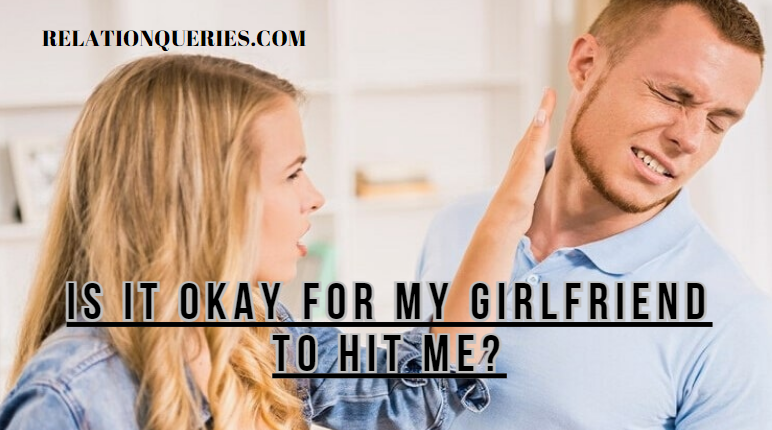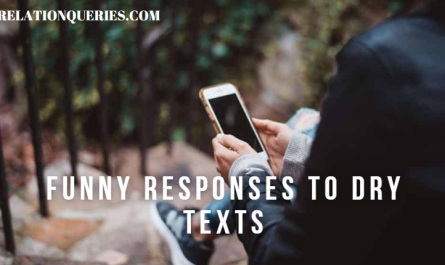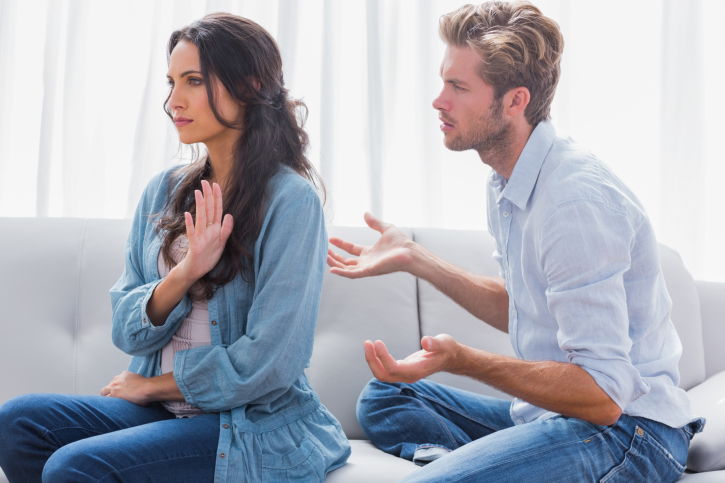
Is It Okay For My Girlfriend To Hit Me:- Relationships are a complex dance of emotions, trust, and communication.
While it’s crucial to foster healthy connections, some relationships can turn toxic or abusive.
In this article, we will explore the topic of physical violence in relationships, particularly focusing on the question, “Is it okay for my girlfriend to hit me?”
We’ll delve into the dynamics of unhealthy relationships, discuss the impact of gender stereotypes on domestic violence, explore avenues for seeking help and support, and offer advice for fostering healthy relationships.
Is It Okay For My Girlfriend To Hit Me?
No, it is not okay for anyone, regardless of their gender or relationship status, to hit or physically harm another person.
Physical violence is not acceptable in any relationship and goes against the principles of respect, trust, and healthy communication. It’s important to prioritize your safety and well-being.
If you are experiencing any form of abuse or violence, it is recommended to seek help and support from trusted friends, family members, or professional organizations, such as domestic violence helplines or local authorities.
In any relationship, it is vital to establish and maintain a foundation built on respect, trust, and open communication.
However, there are instances where the boundaries of a relationship are crossed, leading to harmful behaviors.
One such behavior is physical violence, which can cause significant emotional and physical harm.
5 Signs You’re Dating A Female Player
Understanding Relationship Dynamics
#1. Power dynamics in relationships
Power dynamics play a crucial role in the dynamics of any relationship. Healthy relationships thrive when power is balanced, and decisions are made jointly.
However, when one partner exerts control or dominance through physical aggression, it becomes a concerning issue that needs to be addressed.
#2. Physical violence and abuse
Physical violence in relationships is never acceptable, regardless of the gender of the individuals involved.
It is important to understand that abuse is not limited to physical acts alone; it also includes emotional manipulation, verbal abuse, and other controlling behaviors that contribute to an unhealthy relationship.
Signs Of An Unhealthy Relationship
#1. Recognizing abusive behavior
Identifying the signs of an unhealthy relationship is the first step in addressing the issue.
Some common signs of abuse include physical aggression, constant criticism, controlling behavior, isolation from friends and family, and excessive jealousy.
These behaviors can cause long-lasting emotional and physical trauma.
#2. Emotional manipulation
Emotional manipulation is another form of abuse that can manifest in various ways, such as guilt-tripping, gaslighting, or threatening self-harm.
It is essential to recognize these manipulative tactics to break free from an abusive cycle.
Gender Stereotypes And Domestic Violence
#1. Breaking down stereotypes
Society often perpetuates harmful gender stereotypes, portraying men as strong and invulnerable while women are seen as delicate and in need of protection.
These stereotypes can contribute to the underreporting of male victims of domestic violence and hinder their ability to seek help.
#2. Male victims of domestic violence
It is crucial to acknowledge that men can also be victims of domestic violence. Physical abuse or emotional manipulation from a female partner can cause significant harm and should not be trivialized or ignored.
Society needs to provide equal support and resources for all victims, regardless of their gender.
Seeking Help And Support
#1. The importance of communication
Communication plays a vital role in any relationship, especially when addressing issues of violence or abuse. If you find yourself in a situation where your girlfriend is hitting you, it is crucial to initiate a conversation about the problem.
Choose a calm and safe environment to express your concerns, emphasizing that physical violence is never acceptable or justified.
#2. Counseling and therapy options
Seeking professional help can be beneficial for both individuals involved in an abusive relationship.
Couples therapy or individual counseling can provide a safe space to explore the underlying causes of the violence and develop strategies for healthier communication and conflict resolution.
Trained therapists can offer guidance and support throughout the healing process.
Legal Considerations And Resources
#1. Reporting domestic violence
If you are experiencing physical violence from your girlfriend, it is important to prioritize your safety. You have the right to protect yourself from harm.
Depending on your jurisdiction, there are legal avenues to pursue in cases of domestic violence. Contact local authorities or seek advice from legal professionals to understand your options and how to ensure your safety.
#2. Local support organizations
There are numerous organizations dedicated to supporting victims of domestic violence. Reach out to local helplines or organizations that specialize in assisting individuals in abusive relationships.
They can offer guidance, resources, and a safe space for you to share your experiences and seek support.
National Domestic Violence Hotline
Empowering Healthy Relationships
#1. Building trust and respect
Healthy relationships are built on trust, respect, and mutual understanding. It is essential to establish clear boundaries and expectations with your partner.
Open and honest communication can foster a healthier dynamic and reduce the risk of physical violence.
#2. Conflict resolution and boundaries
Conflict is a natural part of any relationship, but it should never escalate into physical violence.
Learning healthy ways to resolve conflicts, such as active listening, compromise, and finding common ground, can help prevent violence from occurring.
Setting boundaries and respecting each other’s limits is also crucial for maintaining a healthy relationship.
Why Is It Normal For Your Girlfriend To Hit You?
Now let us explore the topic of physical violence within relationships and specifically address the question of why it may be considered normal for a girlfriend to hit her partner.
While it is important to note that violence in any form is never acceptable, this article aims to shed light on some underlying factors that may contribute to such behavior.
By understanding these reasons, we can work towards fostering healthier and more respectful relationships.
#1. Lack of Effective Communication
One reason why physical violence may occur in relationships is a lack of effective communication.
When partners struggle to express their emotions, concerns, or frustrations constructively, it can lead to unresolved conflicts that escalate into physical altercations.
#2. Emotional Imbalance
Emotional imbalance, such as anger management issues or emotional volatility, can contribute to physical violence.
When individuals struggle to regulate their emotions, it becomes challenging to address conflicts peacefully, leading to physical aggression.
#3. Influence of Past Trauma
Past traumatic experiences can significantly impact how individuals behave in their current relationships.
If a person has experienced violence or abuse in the past, they may be more likely to exhibit aggressive behavior in their present relationships as a coping mechanism or as a result of unresolved trauma.
#4. Unhealthy Role Models
Growing up in an environment where violence was normalized or witnessed can shape one’s understanding of acceptable behavior.
If individuals have been exposed to unhealthy role models who resort to physical violence, they may emulate these behaviors in their own relationships.
#5. Power Dynamics in Relationships
Power dynamics play a significant role in relationships, and when one partner holds a disproportionate amount of power, it can lead to the use of physical force to exert control or dominance.
This can occur in both heterosexual and same-sex relationships.
#6. Emotional Dependence
In some cases, emotional dependence on a partner can contribute to accepting physical violence as normal.
When individuals feel they cannot live without their partner, they may tolerate abusive behavior in fear of being alone or abandoned.
#7. Substance Abuse and Alcoholism
The influence of substance abuse and alcoholism can exacerbate violent behavior within relationships.
When under the influence, individuals may act impulsively and become more prone to aggression, resulting in physical violence.
#8. Psychological Disorders
Certain psychological disorders, such as borderline personality disorder or conduct disorder, may increase the likelihood of engaging in physically violent behavior.
These disorders can affect one’s ability to regulate emotions and interact appropriately with others.
#9. Societal Conditioning
Societal conditioning plays a role in shaping our understanding of gender roles and expectations.
In some cultures or communities, there may be an ingrained belief that it is acceptable for women to resort to physical violence against their male partners.
This societal conditioning can normalize and perpetuate the idea that it is normal for a girlfriend to hit her boyfriend.
#10. Lack of Boundaries
A lack of clear boundaries within a relationship can contribute to physical violence.
When partners fail to establish and respect personal boundaries, it can lead to a breakdown in communication and an increased likelihood of resorting to physical aggression.
#11. Fear of Abandonment
Fear of abandonment can be a powerful motivator for certain individuals to tolerate physical violence.
They may believe that accepting abuse is necessary to prevent their partner from leaving them.
This fear can keep them trapped in an abusive cycle.
#12. Learned Behavior
Behavioral patterns learned from childhood or previous relationships can influence how individuals navigate their current relationships.
If someone grew up in a household where violence was present or had been in an abusive relationship before, they may be more inclined to perpetuate that behavior.
#13. Seeking Professional Help
Addressing physical violence in a relationship requires professional intervention.
Couples therapy, individual counseling, anger management programs, or support groups can provide valuable resources and guidance to help couples break free from the cycle of violence and develop healthier relationship dynamics.
What Should I Do If My Girlfriend Hits Me?
Physical violence within a relationship is an unfortunate reality that can occur regardless of gender.
When it comes to abusive behavior, it is essential to prioritize personal safety and take appropriate actions to address the situation.
Now let’s aim to guide what to do if your girlfriend hits you, highlighting the importance of self-care, communication, seeking support, and making informed decisions.
#1. Understanding the situation
Experiencing physical violence from a partner can be emotionally distressing and challenging to comprehend. It is crucial to acknowledge the impact it has on your well-being and mental health.
Assessing the overall dynamics of the relationship is the first step in understanding the severity of the issue and determining the appropriate course of action.
#2. Prioritize personal safety
Your safety is of paramount importance. If your girlfriend hits you, it is crucial to react swiftly and ensure your immediate well-being.
Remove yourself from the situation if possible and find a safe space where you can collect your thoughts. Creating distance allows for a calmer and more rational approach to addressing the issue.
#3. Communication and reflection
Once you have ensured your immediate safety, it is essential to address the incident calmly. Find a suitable time and place to discuss your concerns with your girlfriend.
Communicate openly about the incident and express your feelings without resorting to aggression. It is vital to approach the conversation with the intention of seeking resolution and understanding.
In some cases, professional help may be necessary to navigate the complexities of an abusive relationship.
Seeking guidance from therapists, counselors, or support groups specializing in domestic violence can provide valuable insights and support during this challenging time.
#4. Seek support from trusted individuals
Seeking support from friends, family, or other trusted individuals is crucial when dealing with the aftermath of physical violence in a relationship.
Share your experiences and emotions with those who can provide a supportive and non-judgmental environment. Their guidance and understanding can help you regain a sense of stability and offer valuable perspectives.
#5. Assessing the relationship dynamics
It is essential to assess the dynamics of the relationship beyond the isolated incident of physical violence. Look for patterns of abuse or controlling behavior that might have been present before the incident.
Recognizing these patterns can shed light on the overall health of the relationship and guide your decision-making process.
If you are uncertain about the situation or require expert advice, consider reaching out to professionals who specialize in domestic violence.
They can provide objective insights and help you understand the potential risks and consequences associated with continuing the relationship.
#6. Recognizing red flags
In evaluating the situation, it is crucial to be aware of the red flags that indicate an unhealthy relationship.
These signs may include controlling behavior, constant criticism, intimidation, or isolation from friends and family.
Trust your instincts and take note of any recurring patterns that may indicate a cycle of abuse.
#7. Setting boundaries and expectations
Establishing clear boundaries and expectations is essential in any relationship. Communicate your need for respect, both physically and emotionally.
Healthy relationships are built on mutual understanding and compromise.
Engage in open discussions with your girlfriend to establish boundaries that ensure both parties feel safe and valued.
#8. Seeking legal protection if required
If the situation escalates or you fear for your safety, it may be necessary to seek legal protection. Consider reporting the incident to the appropriate authorities, who can guide you through the legal process.
In some cases, obtaining a restraining order or protective order may be necessary to ensure your safety.
#9. Deciding the future of the relationship
Determining the future of the relationship after an incident of violence requires careful consideration and self-reflection.
Evaluate whether the relationship is healthy, supportive, and capable of positive change. Seek guidance from professionals, friends, and family to gain different perspectives on your situation.
Ultimately, making an informed decision that prioritizes your well-being is crucial.
Can I Hit My Girlfriend If She Hits Me?
In a healthy and loving relationship, conflicts and disagreements are bound to arise. However, resorting to violence as a means to resolve these conflicts is never acceptable or justified.
This article aims to explore the importance of non-violent conflict resolution in relationships and why hitting your girlfriend should never be considered an appropriate response, even if she hits you first.
We will delve into the consequences of violence in relationships and provide alternative strategies for addressing conflicts peacefully.
Understanding Conflict in Relationships:
Conflicts are a natural part of human interaction, and romantic relationships are no exception. They can stem from differences in opinions, values, expectations, or simply misunderstandings.
It is crucial to approach conflicts with empathy, respect, and a willingness to listen and understand each other’s perspectives.
The Cycle of Violence:
Violence within relationships often follows a predictable cycle. It typically begins with tension building, followed by an incident of violence, and eventually, a period of reconciliation and calm.
However, this pattern tends to repeat and escalate over time, leading to a toxic and dangerous dynamic. Breaking this cycle is crucial for the well-being and safety of both partners.
Effects Of Violence On Relationships:
Engaging in violence, whether initiated by one partner or in response to it, has severe consequences for individuals and their relationships.
Physical and emotional harm can occur, leading to long-lasting trauma, diminished trust, and deteriorating mental health.
Children who witness violence between their parents may also suffer from psychological and behavioral issues, perpetuating a cycle of violence in future generations.
Legal and Ethical Implications:
In many jurisdictions, physical violence within a relationship is illegal, regardless of who initiated it. Engaging in violence can result in criminal charges, protective orders, and a range of legal consequences.
Moreover, ethically, it is essential to treat one another with dignity and respect, recognizing the inherent value of every individual.
Non-Violent Conflict Resolution:
Resolving conflicts in non-violent ways is not only ethically sound but also essential for the overall health and longevity of a relationship. Here are some strategies to consider:
- Communication: Open and honest communication is key. Discuss your feelings and concerns in a calm and respectful manner, allowing both partners to express themselves freely.
- Active Listening: Truly listening to your partner’s perspective without interrupting or dismissing their feelings fosters understanding and empathy. Reflective listening techniques can help validate each other’s experiences.
- Seek Mediation or Counseling: If conflicts persist and become challenging to address independently, seeking the assistance of a professional mediator or counselor can provide a safe space for constructive dialogue and resolution.
- Establish Boundaries: Clearly define and respect each other’s boundaries, both physical and emotional. Healthy boundaries contribute to a sense of safety and security within the relationship.
- Emotional Regulation: Learning healthy ways to manage anger and frustration is crucial. Practice self-care, engage in activities that reduce stress, and seek therapy or anger management techniques if needed.
- Take a Timeout: If a conflict escalates and emotions run high, it is often helpful to take a temporary break from the situation. Use this time to cool down, reflect, and regain composure before resuming the conversation.
Conclusion
In conclusion, it is never okay for your girlfriend or any partner to hit you. Physical violence in a relationship is a clear indication of an unhealthy dynamic that requires attention and intervention.
It is important to recognize the signs of an abusive relationship, break free from harmful gender stereotypes, seek help and support, and work towards fostering healthy relationships based on respect and open communication.
Remember, your safety and well-being should always be a priority.
If you find yourself in an abusive situation, reach out to the appropriate authorities, local support organizations, or trusted friends and family who can provide the necessary support to help you navigate through this challenging time.
FAQs
A. No, physical violence is never acceptable in any relationship. It is important to prioritize your safety and seek help if you are in an abusive situation.
A. Seeking professional help, such as couples therapy or counseling, can provide guidance and support in addressing physical violence within your relationship.
A. Reach out to trusted friends, family, or helplines specializing in domestic violence. They can provide resources and support to help you safely leave the abusive situation.
A. physical violence is never justified. There are healthier ways to address conflicts and communicate within relationships.
A. Breaking the cycle of violence often requires professional intervention. Seek help from therapists or support groups that specialize in domestic violence to develop strategies for change.




One thought on “Is It Okay For My Girlfriend To Hit Me?”